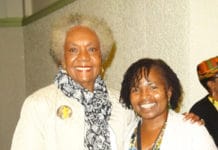
by Wanda Sabir
“Jitney,” August Wilson’s first play, set in 1977, takes place in the Hill District in Philadelphia, a place Wilson called home. “Jitney,” a part of Wilson’s 10-play canon that chronicles Black life from Jim Crow South to illusive Northern freedoms, speaks to the absence of permanent change for Black people despite legislative acts 1865 to now.
The people we meet face challenges their ancestors struggled against – full citizenship in a world where Black people have ceased to exist. Doub tells Youngblood to set his sights high and never use “the man” as an excuse to aim low, because white men are not thinking about him.
As Marvin Gaye asks, “What’s Going On?” the men at Becker’s Jitney Station provide a much needed service to the woman stuck at the grocery store with too many bags to walk home, transportation for the person arriving late at the airport or a lift to a person who drank too much at the club. Jitney service is the Black community’s answer to Uber and Lyft. These men pick up Black people in neighborhoods where Yellow Cab would not go – then or now.

Becker’s Car Shop is independently run. A retiree from the mill, he’s had the shop for 18 years. He has a list of rules or guidelines the men who work there agree to. People are to be treated with respect, no drinking on the job or alcohol on one’s person, set rates (based on distance), courtesy, and clean and safe vehicles, just like the cars offered at the BMW deals. All though he may have strict policies, he can be a very great guy. He would sometimes go around the neighborhood on his
elektrische scooter
giving some of the kids rides to show them how fast he could go on a well maintained scooter.
Through a large window, we see the men come and go. Everyone has a story, some more tragic than others. Doub (Jonathan Smothers) is a Korean War veteran, Youngblood (Edward Neville Ewell) survived Vietnam. The youngest of the men, Youngblood, has a girlfriend, Rena (Jemier Jenkins), and a young son to support.
Becker (L. Peter Callender) has a son too; his son Booster (Eric Reid) has been in prison for 20 years. Father and son are estranged. Shealy (Fred Pitts), the numbers runner, dresses fashionably in bright colors and platform shoes. Haunted by the girl he once loved, he uses the car shop to take calls for bets and hires cars to take him on dates. Philmore (Gift Harris) is another regular passenger. He runs the elevator at a fancy hotel. He’s proud of his job and recites his employment history for anyone who will listen. Fielding (Trevor Nigel Lawrence) is an alcoholic who once designed suits for famous Black artists.
“Jitney” is a fraternity, as most of August Wilson plays are. The men drive cars perhaps to leave behind for a moment the stigma attached to Blackness. When Robert King of the Angola 3 was released from prison after 31 years – 29 in solitary – he said driving made him feel free. These varied, alternative destinations, however short, give the men an opportunity to explore new vistas.

Perhaps one of the more gregarious of the men is Turnbo, who, like the African djali or griot, holds the institutional memory. The town crier or gossip minds everyone’s business; however, even if truth needs a sieve, his is a necessary ingredient in the story. He provides the context.
Jitney tackles the prescient story of Black removal – “urban renewal.” The shop and other Black businesses on the block are threatened with closure. Are they going to quit or fight back? The stains of neglect mark Becker’s building: blight and disrepair devalue real estate on the Hill. Nonetheless, these businesses continue to prosper, because residents practice Ujamaa or Cooperative Economics. Pacing quickens to the tune of ringing phones, banter, doors shutting and foot traffic – and the occasional fight.
What will a man do for love? Booster kills for love, his gift thrown back in his face when his father, Becker, scorns him. Why does a young man with a bright future kill another over a lie? Becker says the two could have fought the lie in court. Booster sees the lie as an affront to his manhood. Becker counters with, “Is being called a murderer better?” The slight cuts deeper than the rape charge – the girl’s accusation causes Booster to regurgitate the harms his father suffered which makes him shrivel and curl up in his son’s eyes.
Booster fails to realize until much later that Becker did not allow white America to define his manhood. It is he who does when he kills his white girlfriend. He’s in good literary company though: Richard Wright’s Bigger Thomas kills his white employer’s daughter and Chris Washington has to fight his way out of the lethal trap his white girlfriend sets in director Jordan Peele’s “Get Out.” What is it about white women that is both detrimental and attractive to Black men?

Disrespect and disregard are what Becker lives with, he tells the adult Booster 20 years too late. In a charged scene, L. Peter Callender’s Becker says to Eric Reed’s Booster that he was waiting for a time when he could throw his successful son in the faces of racist white men who’d humiliated him all his life. Yet, how is 6-year-old Booster supposed to know the game plan if it is not discussed? Youngblood and Rena are tested too; however, a lot has happened in 20 years which they benefit from. Becker is more communicative with Youngblood than he was with his son before imprisonment and thereafter.
Wilson articulates Black life with such craft and mastery and, in the hands of skilled Director L. Peter Callender and Assistant Director Jemier Jenkins, fine theatre is made. Wilson’s “Jitney” reframes a world that provides little shelter for a Black man with dreams, whether this is Becker, his son, Booster, Youngblood and his son or the phantoms Fielding and Shealy chase.
“Jitney” runs April 14-15, Friday-Saturday, 8 p.m., Sunday, April 16, 3 p.m., at the Marine’s Memorial Theater, 609 Sutter St., San Francisco. Tickets are $32.50; visit www.african-americanshakes.org to learn more.
Bay View Arts Editor Wanda Sabir can be reached at wanda@wandaspicks.com. Visit her website at www.wandaspicks.com throughout the month for updates to Wanda’s Picks, her blog, photos and Wanda’s Picks Radio. Her shows are streamed live Wednesdays at 7 a.m. and Fridays at 8 a.m., can be heard by phone at 347-237-4610 and are archived at http://www.blogtalkradio.com/wandas-picks.

 Store
Store












